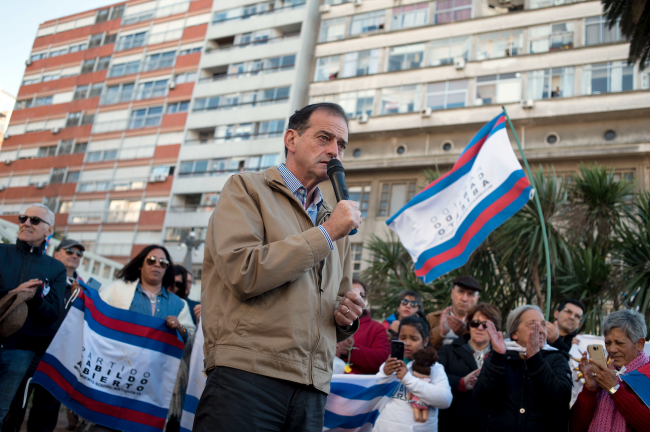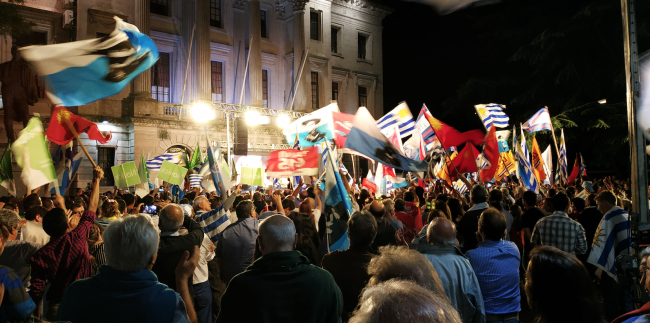
This piece appeared in the Spring 2024 issue of NACLA's quarterly print magazine, the NACLA Report. Subscribe in print today!
Leer este artículo en español.
On November 24, 2019, in the second round of a very close presidential election, the self-described “multicolor coalition,” made up of all of Uruguay’s right-wing and center-right parties, came out as the winner. Among the coalition members was Cabildo Abierto, a recently formed party that in the October 27 general elections had managed to consolidate itself as the first right-wing party in the country’s history to achieve a significant portion of the vote. Since the 1920s, Uruguayan electoral law has hidden a system of multiple parties under a framework of apparent bipartisanship, stimulating the presence of diverse ideological groups under the banners of the National Party and Colorado Party.
Cabildo Abierto formed in the summer of 2019, absorbing the most radical right-wing elements of the National and Colorado Parties, the “military family,” and the various nuclei of reaction against the left-wing Frente Amplio, which had been in power for three consecutive terms. In the 2019 election cycle, then, the most significant novelty—in addition to a change in government after 15 years of progressive administrations—was without a doubt the fact that, for the first time, a completely new party obtained very successful results, consolidating itself as a key actor with access to participate in a parliamentary majority and the course of the new government.
The profile of the electorate and the motives behind the vote for Cabildo Abierto haven’t yet been studied in-depth. Nevertheless, among the 2019 voters for Cabildo Abierto, we can identify considerable swaths from popular sectors, including people who once voted for former president José Mujica. These voters saw in Guido Manini Ríos, the presidential candidate and leading figure of Cabildo Abierto, a charismatic leader who responded to their immediate concerns, above all regarding pressing security issues.
But this electorate also expressed that Uruguayan society—perhaps more gradually than is the case in other Latin American and European countries—is navigating a turn toward more critical views on the functioning of democracy, political parties, and politics. This process is happening simultaneously with the growth in prestige of the Armed Forces and a general slide of public opinion toward more right-leaning positions, as well as an erosion of the traditional suspicion towards militaristic and far-right views. This all emerges amid an incipient but effective climate of “culture wars,” in which progressive forces are the enemy target and the “dictatorship of political correctness” is repeatedly invoked. In Uruguay, with the often extreme positions of its party militants and leaders, Cabildo Abierto is the force that, as a real black swan, has come to partially express this new sensibility.

A Party with a History
The rise of Cabildo Abierto in February 2019 surprised many. However, it did not arise spontaneously. For one thing, its emergence was directly related to the malaise aroused among retired military men and civilians linked to the 1973–1985 dictatorship after the start of legal proceedings in 2005 against those responsible for state terrorism. The party’s creation was also a response to the creation of public policies for memory and redress in relation to the dictatorship and the years of authoritarianism leading up to the 1973 coup.
Precursors closely connected to the rise of Cabildo Abierto include the emergence at the end of 2010 and the beginning of 2011 of the retired military group Foro Libertad y Concordia; initiatives to fundraise for the defense of military personnel and civilians facing prosecution; the launch of various websites, digital media outlets, and groups linked to the promotion of these pro-military ideas, the most representative of which was the web platform Uruguay Militaria; and the deepening ties of these groups with international far-right organizations and networks like the Union of Democratic Organizations of America (UnoAmérica).
All of these initiatives were associated with the public actions of notable figures linked to the last civil-military dictatorship, who, from the outset, occupied positions of leadership and organization within the ranks of Cabildo Abierto. The cases of Enrique Mangini, Eduardo Radaelli, and Antonio Romanelli, among others, stand out. Mangini, one of Cabildo leader Manini Ríos’s most trusted figures, is a former member of the Juventud Uruguaya de Pie (JUP), a far-right youth movement, led by one of Manini Ríos’s older brothers, that was very active between 1970 and 1974. Mangini is accused of carrying out the 1972 murder of student Santiago Rodríguez Muela, and he served as bodyguard for the late dictatorship-era general Iván Paulós. A member of far-right organizations like UnoAmérica, Mangini hosted political meetings at his home with Manini Ríos and several military retirees in 2018 and 2019. Radaelli, for his part, another man closely trusted by Manini Ríos, is a former military official who was extradited to and tried in Chile for the kidnapping and murder of the chemist Eugenio Berríos, who had worked in dictator Augusto Pinochet’s secret police and whose remains were found buried on a Uruguayan beach in 1995. Radaelli has been fundamental in the work of managing and financing Cabildo Abierto. Finally, Romanelli served as a guard in one of the main prisons for political prisoners during the dictatorship, and he has been accused of torture, abuse, and antisemitism.
In December 2018, the Artiguista Social Movement, the direct forerunner of Cabildo Abierto, publicly announced its formation. The name General Guido Manini Ríos made the rounds, even before he was dismissed from the military. He ended up being the presidential candidate and leader of the new party.
The Rise of a Military Caudillo
The appointment of Manini Ríos first as a general in 2011 and later as commander of the Armed Forces in 2015 seems only to be explainable through the logic of the classic conception of the “meeting of the combatants” (encuentro de los combatientes). This strange link brought together—and perhaps still brings together—the MLN-Tupamaros, the main leftist guerrilla that emerged in the 1960s, and the military officials connected to the most nationalist and extreme tendencies of the 1973–1985 military dictatorship, who are the drivers of the new political party. The underlying idea of “combatants” alludes to the preeminence that both the military and the guerilla give to armed conflict as a form of confrontation.
From 2011 until his death in August 2016, Tupamaro member Eleuterio Fernández Huidobro served as minister of defense, under the governments of leftist presidents Tabaré Vázquez and José Mujica. The main legacy of his ministry’s military policy was precisely Manini Ríos’s political and military impact. In his nearly five years as commander-in-chief of the Armed Forces from 2015 to 2019, Manini Ríos violated constitutional and institutional norms with his constant political pronouncements. He thus played a leading role in numerous incidents that had strong political effects. He constantly used social media to issue messages opposing the government’s human rights policy and the trials of military personnel for their roles in dictatorship-era state terrorism. He gave speeches rousing his troops with a clearly political tone, repeatedly transgressed the strict norms of secularism in the performance of his duties, and clashed harshly with organizations of relatives of the detained and disappeared, who repeatedly accused him of obstructing the search for their loved ones’ remains. He also publicly clashed with government ministers and legislators in defending the Army’s demands, particularly regarding changes to the military pension and retirement system, among other episodes that were only sanctioned at the end of his administration.
Read the rest of this article, available open access for a limited time.
Magdalena Broquetas is a historian and associate professor at the Universidad de la República in Uruguay.
Gerardo Caetano is a historian and full professor at the Universidad de la República in Uruguay.
Broquetas and Caetano recently coordinated the publication of Historia de los conservadores y las derechas en Uruguay. Siglos XIX–XXI (three volumes) and are responsible for the Group for Historical Studies on Right Wings in Uruguay.

